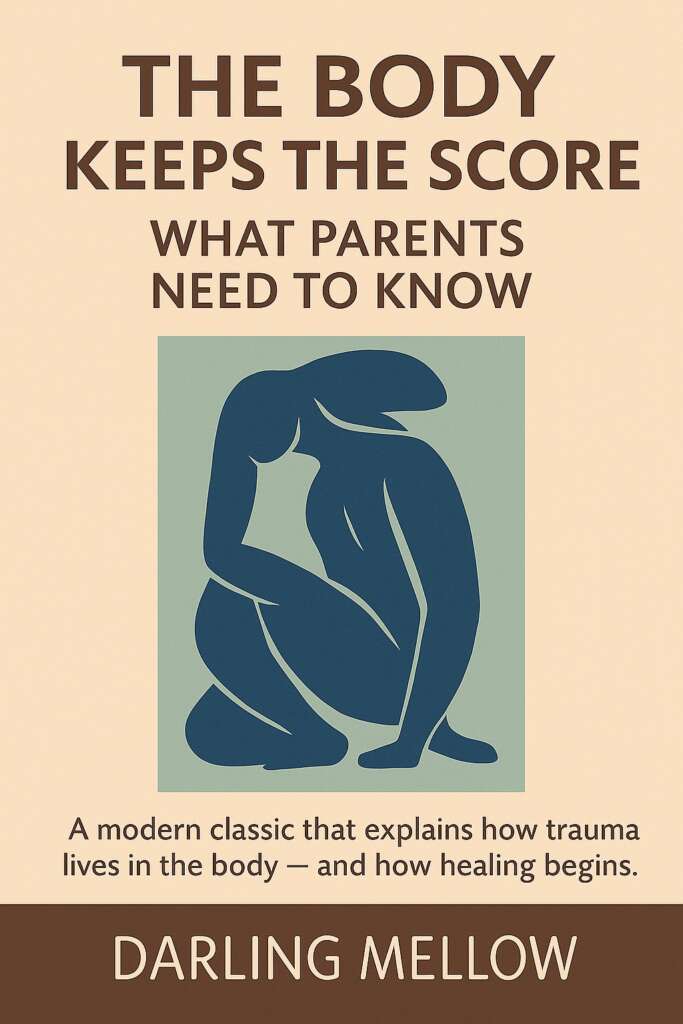The Body Keeps the Score: Why This Book Still Matters in 2025
First published in 2014, The Body Keeps the Score by Bessel van der Kolk has become a cornerstone for anyone trying to understand trauma. A decade later, it is still topping charts, still being recommended in therapy rooms, and still landing on the bedside tables of parents, survivors, and professionals. Here’s why this book matters now more than ever, and how it connects to everyday family life.
A modern classic that explains how trauma lives in the body — and how healing begins.
What the book is about
At its core, the book explains how trauma is not just a story in the past but something that lodges in the body. Van der Kolk, a psychiatrist and researcher, shows how the brain, nervous system, and body carry the imprint of overwhelming experiences. That’s why people can feel stuck in cycles of hypervigilance, anxiety, or shutdown, even when the danger has long passed.
Instead of focusing only on talk therapy, he highlights approaches that reconnect mind and body: EMDR, yoga, somatic therapies, theatre, and safe connection with others. It is a shift away from “just get over it” thinking to a science-backed understanding of what trauma really does.
Why it still resonates in 2025
We live in a time where conversations about mental health are everywhere, but trauma awareness is still catching up. Schools, workplaces, and even health services are slowly adopting trauma-informed practices, but families often feel left to piece things together on their own. That is where this book continues to land so heavily with readers.
In the last few years, studies have confirmed how early experiences shape lifelong health outcomes, from immune function to heart disease. Trauma is not just psychological — it is physical, social, and generational. Reading this book today feels like both validation and a call to rethink how we support children and adults who carry invisible burdens.
What parents and carers take from it
Many parents find themselves reading The Body Keeps the Score after burnout, breakdown, or when raising children with complex needs. It can be heavy, but it also offers hope. The message is clear: healing is possible, but it takes more than willpower. It takes safe relationships, gentle practices, and patience.
For mums especially, the book gives language to feelings of being constantly “on edge” or disconnected. It shows that these reactions are not weakness or bad parenting — they are the body’s survival patterns. That shift in perspective alone can ease guilt and open the door to compassion for ourselves.
Criticism and caution
No book is perfect. Some critics argue that van der Kolk centres heavily on his own case studies and that not all approaches have equal evidence. It is not a replacement for therapy, and for some readers, the stories of trauma can feel overwhelming. The key is to pace yourself — dip in and out, pause when needed, and treat it as a resource rather than a checklist.
How to read it without drowning in it
- Take your time. This is not a book to power through in a weekend.
- Keep a notebook. Jot down lines that land, but don’t feel pressure to highlight everything.
- Balance it with grounding. Go for a walk, stretch, or do something comforting after reading heavier sections.
- Talk it over. If possible, share reflections with a trusted friend, partner, or therapist.
Where to get it
You can find The Body Keeps the Score in most bookshops and libraries. If you prefer online, it is available here: The Body Keeps the Score on Amazon.
Why this belongs in The Quiet Corner
This book is not light reading, but it has helped millions of people name their experience and start the path toward healing. The Quiet Corner is exactly the place for that conversation — for pausing, reflecting, and knowing you are not alone. If you have read it, share what you took away. If you are picking it up for the first time, know that it might feel heavy, but it could also feel like someone finally put words to what your body has been saying all along.
About the Author
Heather is the founder of Darling Mellow, a UK parenting and home education platform. She combines over a decade of parenting experience with modern digital tools to create real, relatable content for mums.
She’s completed accredited courses in Childhood in the Digital Age and Positive Parenting Strategies to ensure every article blends personal insight with evidence-based information.


